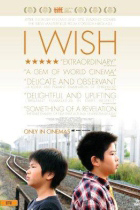Read more from Lyn here 
“The presence of grandparents is a refuge within a family and I wanted to give the children a place where they could relax and feel safe” said Director Kore-eda Hirokazu, when interviewed about his latest movie “I Wish.”
It tells a story about a young Japanese boy Koichi who goes to live at his grandparents’ house in Kagoshima with his mother after his parents’ divorce. His grandmother (whose hobby is hula dancing) and grandfather (who is hatching his own plans to re-establish his sweet rice cake business) have provided him with a stable and loving home. But he desperately misses his younger brother Ryunosuke who has gone to live with his musician dad in Fukuoka.
At the beginning of the movie the new Kyushu Shinkansen bullet train line connecting Kagoshima to Hakata is about to open.
A rumour begins to circulate that at the point where the two new bullet trains will cross for the first time so much energy will be released that anyone who is nearby will have a wish granted. Koichi believes it to be true and hatches a plan to be there. This is the best way he can think of to make his wish for a re-united family come true.
Ryunosuke is not so keen on meeting up with his brother in person. He has settled into his new life with his Dad and has made new friends. Although he has been keeping in touch with Koichi by phone he feels that brothers are connected by an invisible cord that helps them to feel in touch. However when his classmate Megumi warns him that he will forget his brother if he doesn’t see him he changes his mind and agrees to join in.
Koichi and his small group of friends manage to scrape up enough cash for the journey and wag school. (They are aided and abetted in this by some adults including the school nurse). They travel by train to meet up with his young brother hoping to be at the wishing place at the right time.
The two main actors Koichi (Koki Maeda) the serious one and Ryunasuke (Oshiro Maeda) the clown are brothers in real life as well. The movie has purposely not been tightly scripted so that they and their friends can play together and talk amongst themselves in a natural way. This does mean that at times the movie rambles a little. The movie is subtitled in English but this was not too distracting.
The acting is so real that at times you feel you are eavesdropping in on their lives. The children’s’ conversations are playful and sometimes wickedly funny. At other times what they say pulls at your heartstrings. You get to hear what friendships and families mean in their lives and what their hopes and dreams are. Makota loves and loses his dog Marble. Megumi wants to become an actress. Rento aims to become a fast runner.
Living in an extended family has been a normal way of life in many Asian cultures, but not for most of us in New Zealand. Times may be changing. As I look around our circle of friends more and more children and grandchildren seem to be arriving on grandparents’ doorsteps as marriages split and rents rocket to exorbitant levels. Whether it’s just a small growing trend or a tsunami waiting to happen is any-one’s guess.
We have just said goodbye to our grandkids again after 6 months of extended family living. The washing line looks a lot less crowded. The floor is no longer cluttered with toys. Meal times have changed back from large productions to dinners for two. The food and electricity budget doesn’t have to be stretched so far. And the Broadband limit is no longer being exceeded.
It was hard work at times, and occasionally it stretched our patience and sapped our energy. But it was also a good opportunity to spend time with them.
In a minor way we’re going through the empty nest syndrome now all over again. The house is no longer filled with so much joy and laughter. But we are also enjoying having the house to ourselves again. Peace has returned.
If grandparents were granted one wish it would most likely be that their children will be happy and have enough funds to be able to bring up their own children independently.
At times, just like in this movie, this can seem like a miracle which is unlikely to happen. But in the meantime, just like the brothers in “I Wish”, we can see how resilient grandchildren can be when families fall apart. Despite being uprooted, they do continue to grow and develop and make their own kind of meaning of their world.
“I Wish” is a movie which is not just a Japanese story but has a universal message about how children feel and how they cope when confronted with major changes in their lives. It is distributed by Rialto and will be released on 16 August, 2012.








Join the Discussion
Type out your comment here:
You must be logged in to post a comment.